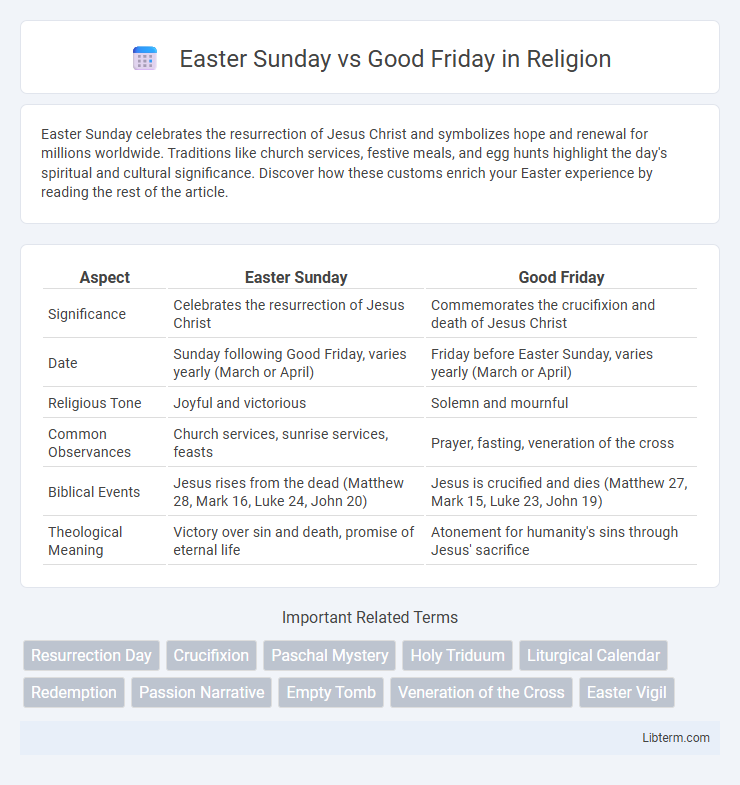Easter Sunday celebrates the resurrection of Jesus Christ and symbolizes hope and renewal for millions worldwide. Traditions like church services, festive meals, and egg hunts highlight the day's spiritual and cultural significance. Discover how these customs enrich your Easter experience by reading the rest of the article.
Table of Comparison
| Aspect | Easter Sunday | Good Friday |
|---|---|---|
| Significance | Celebrates the resurrection of Jesus Christ | Commemorates the crucifixion and death of Jesus Christ |
| Date | Sunday following Good Friday, varies yearly (March or April) | Friday before Easter Sunday, varies yearly (March or April) |
| Religious Tone | Joyful and victorious | Solemn and mournful |
| Common Observances | Church services, sunrise services, feasts | Prayer, fasting, veneration of the cross |
| Biblical Events | Jesus rises from the dead (Matthew 28, Mark 16, Luke 24, John 20) | Jesus is crucified and dies (Matthew 27, Mark 15, Luke 23, John 19) |
| Theological Meaning | Victory over sin and death, promise of eternal life | Atonement for humanity's sins through Jesus' sacrifice |
Introduction: Understanding Easter Sunday and Good Friday
Easter Sunday celebrates the resurrection of Jesus Christ, marking the cornerstone of Christian faith and symbolizing hope and renewal. Good Friday commemorates the crucifixion and death of Jesus, reflecting themes of sacrifice and redemption. Both events are deeply significant in the Holy Week, shaping liturgical traditions and spiritual observances worldwide.
Historical Origins of Good Friday and Easter Sunday
Good Friday commemorates the crucifixion and death of Jesus Christ, marking a solemn day within Christian tradition rooted in the events described in the New Testament Gospels. Easter Sunday celebrates the resurrection of Jesus, symbolizing victory over death and the foundation of Christian faith in eternal life. These observances originated from early Christian practices in the 2nd century, evolving from Jewish Passover celebrations into distinct events reflecting key moments in the Passion narrative.
Biblical Significance of Good Friday
Good Friday commemorates the crucifixion and death of Jesus Christ, a pivotal event in Christian theology symbolizing the atonement for humanity's sins through His sacrifice, as narrated in the Gospels of Matthew, Mark, Luke, and John. The solemn observance emphasizes Jesus' suffering, death, and burial, setting the foundation for the resurrection celebrated on Easter Sunday, which signifies victory over sin and death. The biblical significance of Good Friday lies in its fulfillment of Old Testament prophecies and its role in God's redemptive plan for salvation.
The Resurrection: The Essence of Easter Sunday
Easter Sunday celebrates the resurrection of Jesus Christ, marking the cornerstone of Christian faith and symbolizing victory over death and the promise of eternal life. This event differentiates Easter Sunday from Good Friday, which solemnly commemorates Jesus' crucifixion and sacrifice. The resurrection embodies hope, renewal, and the fulfillment of biblical prophecy central to Christian theology.
Key Differences Between Good Friday and Easter Sunday
Good Friday commemorates the crucifixion and death of Jesus Christ, marking a somber day of mourning and reflection within the Christian faith. Easter Sunday celebrates the resurrection of Jesus, symbolizing victory over death and the promise of eternal life, making it the most joyous and significant event in Christianity. The contrasting themes of sacrifice on Good Friday and triumph on Easter Sunday highlight the fundamental narrative of salvation central to Christian doctrine.
Religious Observances and Traditions
Good Friday commemorates the crucifixion and death of Jesus Christ, observed through solemn church services, fasting, and prayer in many Christian denominations. Easter Sunday celebrates the resurrection of Jesus, marked by joyful worship services, the singing of hymns, and festive ceremonies such as the Easter Vigil. Both days hold significant places in the Christian liturgical calendar, representing themes of sacrifice, redemption, and hope.
Symbolism in Good Friday and Easter Sunday Celebrations
Good Friday symbolizes the crucifixion and sacrificial death of Jesus Christ, marked by somber reflections, fasting, and prayers emphasizing salvation and redemption. Easter Sunday celebrates the resurrection, embodying hope, renewal, and victory over death, often highlighted by joyful church services, festive meals, and symbolic rituals such as the lighting of the Paschal candle. Both days use specific symbols: the cross on Good Friday represents suffering and sacrifice, while the empty tomb and blooming lilies on Easter Sunday signify new life and resurrection.
Role in Christian Theology
Easter Sunday represents the resurrection of Jesus Christ, affirming the triumph over sin and death and serving as the cornerstone of Christian faith and eternal life promise. Good Friday commemorates the crucifixion and suffering of Jesus, emphasizing the atonement for humanity's sins through His sacrificial death. Together, they form the theological foundation of salvation and redemption in Christianity.
Global Perspectives: Observing Good Friday and Easter Sunday Worldwide
Good Friday marks the solemn remembrance of Jesus Christ's crucifixion and death, observed as a public holiday in countries like the United Kingdom, Australia, and parts of Latin America, with services emphasizing mourning and reflection. Easter Sunday celebrates the resurrection of Jesus, symbolizing hope and renewal, and is widely observed through various traditions such as church services, festive meals, and egg hunts across Europe, North America, and many Christian communities worldwide. Cultural variations include the Passion plays in the Philippines on Good Friday and sunrise services by coastal communities in the United States on Easter Sunday, highlighting diverse global practices.
Conclusion: Reflecting on the Importance of Both Days
Easter Sunday and Good Friday hold profound significance in Christian faith, representing the culmination of Jesus Christ's sacrifice and resurrection. Good Friday commemorates the crucifixion and the depth of suffering endured, while Easter Sunday celebrates victory over death and hope for eternal life. Together, these sacred days embody the core of Christian beliefs, offering a powerful message of redemption and renewal.
Easter Sunday Infographic

 libterm.com
libterm.com